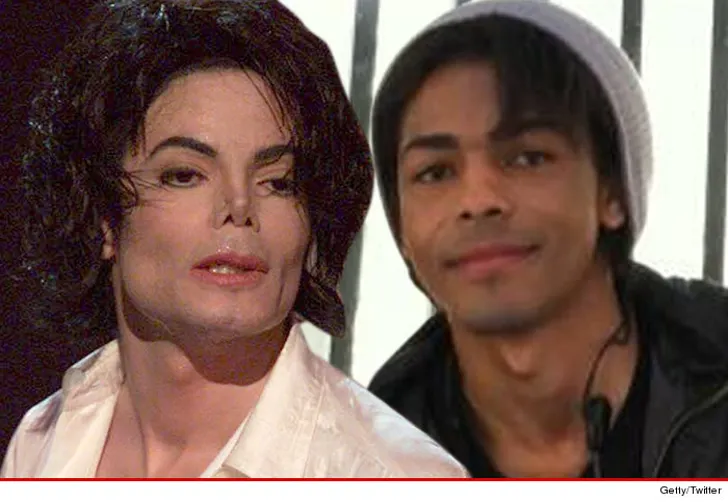
Michael Jackson’s legacy is often punctuated by controversy, and one of the most enduring—and emotionally charged—speculations involves singer-songwriter Brandon Howard, known artistically as B. Howard. Frequently cited as the King of Pop’s potential illegitimate son, Howard has long been at the center of media intrigue. Now, as he steps into the public eye with greater transparency, his story deserves a closer look—one that goes beyond rumors and focuses on his identity as an artist, a son, and an individual in pursuit of his truth.
The Rise of B. Howard

Born on April 2, 1981, in Los Angeles, California, Brandon Howard was immersed in the music world from the beginning. His mother, Miki Howard, a Grammy-nominated R&B and jazz singer, gained fame in the late 1980s with hits like “Come Share My Love” and “Love Under New Management.” Miki’s career introduced Brandon to a constellation of artists, producers, and performers, helping shape his musical DNA from an early age.
Howard’s upbringing was unconventional, surrounded by legendary musicians and artists. He often recalls meeting icons like Gerald Levert, Augie Johnson, and even Joe Jackson, Michael Jackson’s father, who reportedly took a special interest in young Brandon during his formative years. These early interactions, filled with industry mentorship and artistic energy, planted seeds of curiosity about his own identity—both musical and familial.
Building a Career in Music
B. Howard’s natural inclination toward music became evident early on. He learned to play multiple instruments and participated in church choirs and talent competitions. Rather than leveraging his connections for instant fame, Howard chose a slower, more intentional path—working behind the scenes in production and songwriting before stepping into the spotlight.
He eventually found his groove producing and writing for artists such as Ginuwine, Vanessa Hudgens, Lupe Fiasco, and Ne-Yo. His style, often blending R&B, pop, and electronic elements, began gaining traction for its sincerity and emotional resonance.
Howard’s debut single as a solo artist, “Dancefloor,” was followed by the well-received track “Super Model,” which highlighted his silky vocals and polished sound. His song “Night and Day” became a fan favorite, reminiscent of 1980s pop-soul with a modern twist. Critics praised his production sensibilities, often comparing his melodic instincts to that of Michael Jackson himself—further fueling speculation about their connection.
A Global Presence

Howard didn’t just stay within American borders. He has collaborated with international acts such as the Soweto Gospel Choir, and toured across Europe, Asia, and Africa. His music has appeared in commercials, films, and humanitarian campaigns, further solidifying his global reach.
In Japan, where he enjoys a loyal fan base, he has frequently performed and appeared on television. His international approach to music and image has helped him remain resilient in a challenging and competitive industry—especially as whispers about his parentage often threatened to overshadow his artistry.
The Shadow of the Jackson Connection
Though talented in his own right, Brandon Howard’s resemblance to Michael Jackson—facial features, voice, stage mannerisms—has long captured public attention. The rumors of a familial link intensified when a 2014 DNA test, reportedly commissioned by an online media outlet, claimed a 99.9% match between Howard and Michael Jackson.
However, the test’s legitimacy was quickly questioned. Critics pointed out inconsistencies in the documentation and the chain of custody. The Jackson family publicly denied the claims, with Taj Jackson, Michael’s nephew, tweeting that the test was a “fraud.”
Howard’s Response to the Controversy
In response to the growing media storm, B. Howard made a rare public statement:
“I’ve never used my alleged connection to Michael Jackson to further my career. I’ve worked hard to build something of my own. This is about my music, not my DNA.”
He acknowledged that while he respects Michael Jackson’s artistry and legacy, the public fixation on his paternity was never something he encouraged or profited from. Howard has refrained from exploiting the speculation and has declined to make definitive statements on the results of any DNA testing, citing a desire to protect his personal privacy and that of others involved.
A Complicated Family Narrative
Adding complexity to the story is the close relationship between Miki Howard and members of the Jackson family during the 1980s. Some reports claim that Joe Jackson managed Miki for a time and introduced her to his sons. The speculation suggests that Brandon may have been conceived during that period. Yet, there is no concrete evidence publicly confirmed by any party to substantiate those claims.
Miki Howard herself has chosen to remain largely silent on the subject, which some interpret as a way to shield her son from invasive media scrutiny.
A Legacy of His Own
Regardless of the controversy, what stands clear is B. Howard’s undeniable talent and drive. His music resonates with authenticity, drawing from personal experience and emotional depth. He continues to release new material, often independent of major labels, and performs globally to a loyal and growing fan base.
While the debate about his lineage continues in tabloid headlines and YouTube comments, Howard is carving a narrative that’s entirely his own. He is not just a name potentially tied to a musical dynasty—he is a dedicated artist, shaped by his upbringing, inspired by legends, and determined to create a lasting legacy defined by passion, not pedigree.
Final Thoughts
Brandon Howard’s story is one of duality—of fame and privacy, legacy and independence, myth and reality. Though he may never fully escape the comparisons to Michael Jackson, he has proven time and again that his career stands on its own merit.
In the end, perhaps what matters most is not the answer to the question of who his father is, but the truth of who he has become: an artist with heart, discipline, and a voice all his own.




